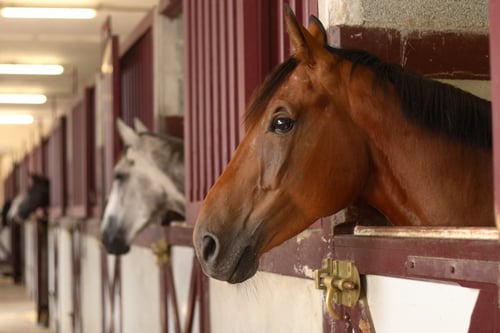Floyd Fain
March 28, 2017 Riding and handling horses involves a considerable amount of personal risk; add in the business end of a barn – boarding, lessons, trailering and so on – and you add professional risk.
Riding and handling horses involves a considerable amount of personal risk; add in the business end of a barn – boarding, lessons, trailering and so on – and you add professional risk.
The experts at EquiSearch remind us that many individuals who participate in equine activities “lack the skills and knowledge to avoid dangerous situations with horses. If they do sustain an injury or loss, they tend to assign blame to a third party.”
If you’ve been to any public or private barn as a boarder or student, you’ve likely seen or signed a disclaimer of liability, or hold-harmless agreement.
However, as a barn owner, you know that just a document is not sufficient to protect you from possible lawsuits. You also have to carry liability insurance in the form of a policy written to cover equine activities.
1. Don’t rely on homeowner’s insurance
If the boarding barn is on your home property, you may think the barn and its business are covered by your homeowner’s insurance. Think again.
Stable Management quotes attorney Ruth Beardsley, who specializes in equine law: “If you are a personal horse owner and rent out one stall in your backyard or offer free board in exchange for help at the farm, that is considered commercial activity and falls outside your homeowner’s policy.” That commercial activity naturally extends to the activity of multiple boarders, trainers and paid barn staff, which makes coverage even more critical.
2. Types of insurance to consider
Consulting with your attorney – or, even better, an attorney specializing in equine law – can put you in a better position to decide the scope and coverage of insurance policies that include:
Commercial General Liability. This standard policy is designed to protect businesses from liability claims tied to bodily injury, personal injury and property damage.
Worker’s Compensation. This policy is mandatory for all businesses, “although the minimum requirements may vary,” according to Stable Management. Anyone who works in your barn, whether salaried or hourly, is considered an employee in the eyes of many courts. (And carefully consider the risk involved in hiring teenagers to muck stalls or turn out horses. Liability involving minors can take your business in very perilous directions.)
Instructor/Independent Contractor Insurance. Those who work in your barn off-salary are not covered under your standard liability policy. If a rider is injured during a lesson taught by a non-salaried trainer, “the claim could come back against the farm if the instructor does not have a policy of their own,” notes Stable Management.
Equine Liability Insurance. This important stopgap policy protects you in the event a boarding horse is injured or dies in your barn. As the Equine Law Blog states, standard liability policies “typically exclude coverage for claims involving damage to or loss of personal property belonging to others in the stable’s care, custody, or control. In the eyes of the law, horses qualify as ‘personal property.’” This specialized policy can be drafted by an equine-law attorney.
3. 'Known offender'
Yes, a horse can be seen in courtroom's eyes as an “offender” should a child, for instance, wander onto your property and get kicked, bitten or worse. In many states horses are considered an “attractive nuisance,” so discuss with your attorney your options for avoiding a lawsuit.
This blog is not meant to be taken as legal advice; it is simply educational. Contact an experienced attorney for more information regarding liability law and how it applies to your facility and horses. If you require arena equipment, contact Red Master Harrow for advice.

